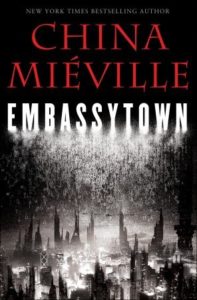 First time, I couldn’t get going on this book. I understand sci-fi fans love learning a foreign world but that should not come at the expense of basic readability. Call me old-fashioned. At a party:
First time, I couldn’t get going on this book. I understand sci-fi fans love learning a foreign world but that should not come at the expense of basic readability. Call me old-fashioned. At a party:
“Ehrsul was autom. Her integument was adorned that night with acrylic peacock feathers, and trid jewellry orbited her. “I’m so tired,” she said. She made her face crackle as if static interrupted it…She only ever used one corpus, according to some Terrephile sense of politesse or accommodation. I think she knew that having to relate to somebody variably physically incarnate would trouble us.” (p. 43)
That’s superficially “interesting” writing, but I come away with no sensory imagery and no feelings for anything or anybody, and not even much understanding. I don’t know what anybody looks like or what kind of a place they are in. I don’t know what acrylic peacock feathers look like nor trid jewelry, either. I don’t know how a person/being makes their face “crackle.” I have nothing.
The whole book is like that: clever vocabulary with plenty of low-frequency combinations and neologisms, and the result, for me, was a big fat zero. Several months later I gave it another try and got through to the end.
The story is told in the first-person voice of Avice Cho, a space traveler and a simile. That’s right. She is, in her person, like, literally, a simile. As suggested (only suggested, not explained), the idea is that the all-important Hosts (whatever they are)
“… had taken all the furniture, then put it back, to allow some figure of speech. The split stone, made so they could speak the thought, it’s like the stone that was split and put together again… Many similes, of course, were uninterested in their status. There were, I gathered, one or two among Staff. Even Ambassadors… “They don’t like being Language,” Hasser said. “It makes them feel vulnerable – they like speaking Language, not being it…” (p. 106).
Got it? Me neither. I gather that the Hosts are cognitively impaired so cannot manage abstraction. The referents of their utterances must be palpable, so they “rearrange the furniture” to make it so. Cool idea, except the very definition of language is that it is symbolic — no logical or “natural” relation between the language and its referents. If your referents must be tangible, then you are probably using gestures, or at best, signs, but not language. The fundamental conceit of the story is spurious and undercuts itself.
Besides impenetrable language in a book that features language, another problem is that nothing happens and nobody cares about anything for hundreds of pages at a time. Nothing is at stake and there is no dramatic tension. Characters walk around, eat, drink, talk and go to festivals. What a life! When a new ambassador comes to town who talks with a unique diction, everybody imitates him and soon the whole population talks like that. His words cause a drug-like addiction at the expense of real thought (as slang, cliché, and jargon do, in fact).
Ultimately then, this is a meditation on language and its relation to thought, but the examples are not true to real psycholinguistics so little insight is to be had. Maybe these aliens were just a bit too alien for me – that’s a matter of personal taste.
On the plus side, the obscure writing style demonstrates the obscurity of the thematic material it illustrates. That’s a kind of poetry in itself. Language is indeed a deep puzzle and this book should strike the very heart of what counts as psi-fi — understanding human psychology in a technological world. But somehow this one misses its mark. Neverthless, it is winner of the Locus SF award, nominated for several others.
Mieville, China (2012). Embassytown. New York: Del Rey Books. 345 pp.